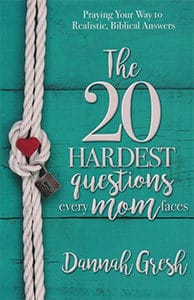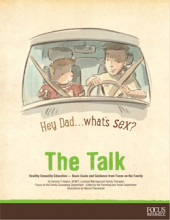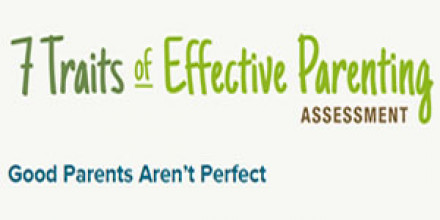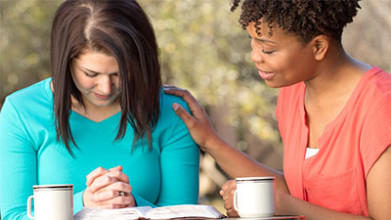Opening:
Teaser:
Mrs. Dannah Gresh: If we are paranoid legalistic moms who do not take our fears to God in prayer, we don’t allow our children to face the Goliaths that God has determined that they will slay.
End of Teaser
John Fuller: Dannah Gresh offers more encouragement for moms today and this is “Focus on the Family.” Your host is Focus president and author, Jim Daly and I’m John Fuller.
Jim Daly: John, I’m so pleased to have Dannah back with us again. Last time we talked about some of the hardest questions every mom faces, kinda honing in on just a few like, how do you know when to share Christ with your child? How to get over insecurities, that fear that you’re gonna mess this up somehow, that you’re imperfect child will be more imperfect because of your parenting?
Those were great starters and if you didn’t hear the program last time, call us here at Focus. Get the download. Download the app on your Smartphone and that’s an easy way to listen to the program. Today we’re gonna kick it off again and get into some more of Dannah’s book, The 20 Hardest Questions Every Mom Faces and I think every mom is gonna be blessed by the discussion.
John: Yeah and let me just say, get the book. Get a CD of the first part of our conversation or as Jim said, the download at www.focusonthefamily.com/radio or call us and we can tell you more, 800, the letter A and the word FAMILY.
And Dannah is a well-known speaker and author. She writes for young women and moms and this book is really based on her own journey as a mom of three. She knows first-hand about a lot of what we’re talkin’ about today.
Body:
Jim: Dannah, welcome back.
Dannah: Thanks; it’s good to be back.
Jim: I want to get back into it.
Dannah: All right, let’s do it.
Jim: You know, last time we may have missed one of the most important questions and we probably should’ve started there, ‘cause I think it’s fundamental. It’s that question of who do you think you are?
Dannah: Oh.
Jim: Man, that’s true for all of us. That’s kind of the faith question, isn’t it?
Dannah: Oh, yeah. That’s the life question, but it really comes into play, I think, as parents because there’s not any more important ask we’re gonna put our hands to than raising little hearts to love Jesus. So, the enemy really breathes that question into our hearts.
And I think what I hear moms saying is that, whatever area of their life they really struggled with is where that question is the loudest. So, if you’re a family that struggles with debt, but you’re teaching your children good budgeting practices and you’re teaching them to tithe and you’re teaching them to save. The question in the back of your mind is, who do I think I am to teach this to them? I messed things up financially. That’s why we’re struggling so much.
For some moms I’ve heard single moms really say, “When I talk to my children about marriage and family and how precious it is and how God wants them to honor that, the question in the back of my head is, who do I think I am? I’m a single mom and I’m telling my children to honor marriage?”
And for me, the question that really comes up when I teach my children about their sexuality and purity, because that’s not an area that I walked out well in my life. And so, the question, who do you think you are just haunts me.
And you know, when I was writing this book, that question came up big time. I probably haven’t felt it be really loud in years, but as I was writing my first, really, my first book for moms, who do you think you are was just all over it.
And I would say every day when I went to write the book, I can’t write this; I can’t write this; I can’t write this. And I was on tour at the time and we had a kind of a day off in Memphis, over Memphis barbecue with my team.
The quietest member, one of the male leaders of the worship team said, “Hey, I’m reading this great book and there’s something that really speaks to my heart as a creative artist. I’m always wondering, who do I think I am to write songs about Jesus, ‘cause I’ve messed up my life so much in so many ways.”
And this author says that she started to reframe the question. Instead of who she is, she talks about whose she is. And she says, “Well, I’m glad you asked. I’m a daughter of the King of the Universe and as such, I have the right to participate in the unfolding of this world.” What a healing balm that was to my heart, ‘cause I thought, I don’t have to have lived my whole life right to be a great parent. I’m a daughter of the King and as such, I have the right to help God unfold the lives of these three that He’s assigned to me.
Jim: Yeah and as we talked last time, for a mom particularly, getting over those fears and insecurities that so many moms have about whether they’re messing up their kids, whether their kids are gonna launch well, whether they’re gonna be in the kingdom, which is kind of, I think as a Christian parent, that’s your goal, to make sure you kids have a vibrant faith in Christ. Again, if you missed that, get it. We covered that question last time.
Let me move to that modesty question. You touched on it. That’s kind of what you’re known for. You have written some brilliant resources, books, other things. It’s what you speak on. Your pain has become your passion, it sounds like.
Dannah: Yeah.
Jim: You describe in the book four myths about modesty. Let’s hit those four myths and then I got some questions behind it.
Dannah: Yeah, well, the first myth is, that the modesty movement or teaching modesty to your daughter or son is gonna forbid the expression of their beauty. I don’t think that’s true at all. I have in my office two, I don’t know what to call ‘em except Barbie dolls. One of ‘em’s a Barbie doll. One of ‘em is Barbie in her disco dress. Okay, it’s not a disco dress. (Laughter) Whatever she wears today.
Jim: This is getting’ more interesting.
Dannah: It’s way too short.
Jim: Why do you have a Barbie (Laughter) in your office? I’m just sayin’.
Dannah: I’m gonna explain. She has her like high heels on and you know, her hair and she’s dressed very skimpily. And any mom would say, “Yeah, my daughter, I don’t want her to dress like that.” And I’ve talked many times about the fact that if Barbie was real, she’s not physically possible.
Jim: Right.
Dannah: For one thing, her neck is so long, she’s like practically a giraffe. If you saw a woman walking around with a neck that long and slender, you’d think that her head was gonna just lop right over. So little girls have this standard of, oh, this is what my body’s supposed to grow up to look like and it’s such a terrible lie.
But on the other hand, I have a Barbie. Her name is Fula. She is from the Middle East. She is the Barbie doll that little Muslim girls play with. There is no form or figure to her body. She’s very nondescript physically. She’s covered in a burkah, so the only part of her you really can is pieces of her face.
And I think that both these two extremes are both harmful to a little girl. I think both of those extremes say, “Your body is a shameful thing or your value is your body.” And what I want moms to do is teach something in the middle, which is, “Your body is a masterpiece created by God. It’s good and it has a useful purpose.”
And when our daughters understand the purpose of it and they understand that the purpose of it is to glorify God and they understand who God is, what I really like to say is, in terms of modesty and every other aspect of life, our children do not need self-esteem. They need God-esteem, ‘cause if they understand who God is and whose they are, they’ll understand the purpose of their body and the value of themselves, but they won’t make too much of it.
Jim: Yeah.
Dannah: And that’s what I think good modesty teaches and that doesn’t forbid us expressing our beauty. Listen, we are created in God’s image. God loved to express beauty with the rainbow. In Revelation, it talks about how beautiful heaven is, like the jasper, throne room. It’s just beautiful, beautiful, beautiful.
Jim: Yeah.
Dannah: And I know guys didn’t get as much of that part of God’s image (Laughter), you know. You know, but girls, we like to express our beauty. That is a part of God in us.
Jim: Yeah.
Dannah: And it’s okay, so teaching modesty does not forbid the expression of beauty. It just gives it boundaries to live inside of.
Jim: Okay, that’s No. 1. Now the other three. You have modesty is a form of misogyny. What is meant by that?
Dannah: Well, I think there are a lot of people who don’t like us to teach boundaries in terms of anything related to our sexuality. And the people that are, you know, trying to get us to say, do anything you want, anytime you want, in any way you want, are the same people that are saying that modesty is a form of misogyny.
And one of the things they use is that, hey, it seems that the Christian culture is always telling girls to be modest, but it’s hardly ever telling boys to be modest. Well, that’s not really true. The Bible tell us that purity and modesty are for both genders, both sexes.
But the majority of the teaching in the Bible is directed towards women. And so, the Christian culture is just reflecting what the Bible reflects. And quite honestly, the clothing manufactured for boys does not objectify them. The clothing being manufactured for girls does objectify them.
Jim: And you have some examples of that. I was kinda taken aback by that. What were the findings that you saw?
Dannah: Yeah, well, recently there’s been a clothing line that just kinda did some research and they compared I think it was the 10 top retail brands that are sold to tween boys and girls. And they compared them and shorts were 55 percent shorter. The girls’ shorts were 55 percent shorter than the boys’ shorts, even just the length of the sleeves. This isn’t a big deal, but the length of the sleeves were 36 percent shorter for girls.
Jim: So, everything’s tighter.
Dannah: Everything’s tighter. Everything’s tinier. Circumference of a shirt at the belly was one to three inches skinnier in girls than it was in boys. Now of course, girls do have smaller frames, but I think the point is, even down to the fabric. The fabric being used to create a girl’s T-shirt was significantly thinner than the fabric being used for a boy’s T-shirt.
So, the fact that we are addressing modesty to our daughters is because the culture is preying upon them. Manufacturers of clothing and beauty products are preying upon girls in such a way that they can be objectified and a wise parent won’t let that happen.
Jim: But it’s tough, I mean, because the culture’s so replete with those options.
Dannah: It is, but you can find those options. You may have to spend more time at the mall. Every mom rejoices!
Jim: Or online.
Dannah: We like shopping. Women like shopping. You missed the joke because you didn’t understand (Laughter) that we like to be in the mall.
John: Our wives actually don’t like shopping anywhere.
Dannah: Oh, really?
Jim: Every kind of shopping, isn’t it, that you like, online, off line, mall, whatever it might be?
Dannah: Yeah, all of it, but I look at shopping, I always looked at shopping with my tween daughter as an opportunity to bond, ‘cause they like to be in the mall.
Jim: That’s true.
John: It’s relational.
Jim: That’s a good thing.
John: It’s smart.
Dannah: And so, it means more time in the mall I would tell them, to find a four-inch inseam or a six-inch inseam or whatever your family standard is, but you can find it.
Jim: Yeah, let’s move to the next one, No. 3 of the myths in the area of modesty that men are off the hook.
Dannah: Yeah, they’re not off the hook. Even though most of the texts in the Scriptures are addressed towards women being modest, there’s one thing that’s only addressed to men and that is, protecting their sisters. You never see women in the Scriptures being placed in the position of protecting the sexual integrity of their brothers.
Jim: Huh.
Dannah: But God says that men are supposed to present their wives a pure and spotless bride before Him. So, I think we can take from that the context that, it is the man’s responsibility to protect the purity and modesty and integrity of women.
And so, men aren’t off the hook. What happens in this very centralized culture is that women are being harmed. They are being taken advantage of at times and a woman should be able to dress any way she wants. She may not adhere to the Scriptures. She may not adhere to a philosophy of modesty. She can dress any way she wants and walk through a group of Christian men and those will be men who say, not what can I take from her, but how can I protect her?
Men are not off the hook. They are charged with protecting, not just their wives and their daughters, but all of womanhood.
Jim: I love that example and that’s rarely talked about. I don’t think most teachings to teen boys in many homes would be in that direction, protect your sisters—Christian sisters or your literal sisters in that way and be there.
Dannah: Absolutely, it’s critical that we teach them that.
Jim: Your fourth myth is modesty is about clothes.
Dannah: Yeah.
Jim: And you debunk that.
Dannah: Yeah.
Jim: What do you say?
Dannah: A really big part of our Secret Keeper Girl ministry, which is our teen touring event that goes across the nation—we do about 100 events a year—it’s defining modesty. And we just talk about how modesty is about being appropriate.
That’s an easy thing for an 8-year-old girl to understand. She’s not gonna wear a Speedo to perform in a piano recital I hope, right?
Jim: No.
John: We hope.
Dannah: No (Laughing). She’s probably not gonna wear a white Chanel polka dot yellow dress. Did I lose you there with Chanel?
Jim: (Laughing) Yeah, isn’t that perfume?
Dannah: No, no, (Laughter) it’s a fabric. (Laughter)
Jim: You can tell I shop a lot. (Laughter)
Dannah: She’s not gonna wear that to a bonfire, right, ‘cause that’s not appropriate. She’s gonna wear jeans and a flannel shirt. So then you take that to the next step of, okay, what’s appropriate in terms of how my body is presented? And you can start to talk in a very safe age-appropriate way about modest clothing.
But it’s really not about clothes, because if you go back to the purpose of our body being ultimately to glorify God and really in the Bible, it says that our purpose is to glorify God with our bodies. We forget those last three words, “with our bodies.” Glorifying God is not some difficult to understand theological thing. It means that my body is in alignment with showing Him off. It’s showing who He is and the ultimate sin of immodesty is that it says, “Look at me instead of look at God.”
Jim: Hm, man, that is well-said.
Dannah: So, it’s not really about the clothes. The clothes are just a piece of it.
Jim: That is well-said. Let me push ya on a couple of things–
Dannah: Oh, here we go.
Jim: –one being, now because I think moms are hearing you and it sounds like, wow, in Dannah’s house that all was perfect.
Dannah: Oh.
Jim: It went well. Did your teen daughters push back with you and say, “Really, mom? Why can’t it?” Let’s get to the real stuff.
Dannah: The best way (Laughter) I can answer your question is to say that there were tears at the mall many times.
Jim: But you just stood firm.
Dannah: Yeah and it wasn’t easy. Quite honestly, there were times I had to bring in the cavalry, AKA dad, (Laughing) especially during things like prom dresses, because it seems like there are certain times that we throw out all the modesty guidelines.
Jim: We’ll make an exception for this dance.
Dannah: Yeah, so this is an exception, so let’s go with the low-cut neckline and the short dress. So, Bob would a lot of times, just intervene and we chose to use carrots instead of sticks. So, there were usually rewards if the girls got on board, ‘cause it is hard. It is very hard to go out there prom dress shopping or shopping for shorts. There are certain areas where it’s really difficult to find something feminine and cute and trendy that’s also tasteful and appropriate.
John: So, what kind of carrots did you offer? (Laughter)
Jim: Yeah, I’m thinkin’ money. (Laughter) I’ll give you 20 bucks if you wear this.
Dannah: Oh, no. Sometimes we would give t hem so much money and you’d say, “If all the clothes that you buy today with this money passes all of our, we call them our “truth or bare” fashion tests and your heart is in a great place and you stay under budget, you get to keep all the extra money for yourself.
So, that was … you know, they had three things there. It wasn’t just you gotta have money left over, but you gotta have your heart in a good place. You gotta adhere to our family preferences. And we called them “family preferences.” I don’t know that the Bible says how long your shorts inseam should be, ‘cause it doesn’t. But these were our family preferences. They would be rewarded for that in some creative way.
Program Note:
John: Dannah Gresh on “Focus on the Family” and the book is The 20 Hardest Questions Every Mom Faces. You’ll find that and a CD or a download of our conversation at www.focusonthefamily.com/radio.
End of Program Note
Jim: All right, let’s go to another one. This is a difficult one, too. You’re hittin’ all the hard questions really. This one is about when do I have the talk with my child and should I tell my kids about my past?
Dannah: Hm.
Jim: Those are delicate questions.
Dannah: Very delicate and often very painful, ‘cause many times the mom that’s struggling with answering those questions has felt some sexual pain, shame in her heart. Maybe she hasn’t even progressed in her healing from that pain and shame.
And so, these are hard questions, ‘cause I’ve walked this one on the hard pavement of life, I think I can give each mom with that concern on her heart some courage today.
The first thing is, I don’t think there’s “a talk.” I don’t think you have “the talk.” I think you have an ongoing conversation.
Jim: Yeah, that’s good.
Dannah: And I think it starts when they’re very small. You know, you can preschooler for a walk and show them a flower in a garden. And you’re gonna see that, that flower has a pistil and a stamen. It has a mommy part and a daddy part. Now that might seem a really basic thing to talk to your preschooler about. Trust me, they’re not gonna have any more questions. They’re gonna be like, whatever.
Jim: (Laughing) No kidding.
Dannah: But that’s a very important little piece in the puzzle of helping them to understand the importance of gender, the importance of a mom and a dad. Little things like that starting in about those preschool years are really important. My mom, she was insane, I have to tell you. (Laughter) She’s the best mom ever.
John: A little insane, right?
Dannah: A little insane because we lived across from a cow field with a milking cow, dairy cows. And every time one of those momma cows went into labor, my mom made a pitcher of Kool-Aid, popped some popcorn and put out lawn chairs.
Jim: (Laughing) On, man.
John: Free entertainment.
Dannah: It entertainment, but it was also her way of prepping us for the [conversation].
Jim: Wow, that could scare ya.
Dannah: Thankfully a little known fact about dairy cows is that they help one another deliver. So, they kind of create a circle, so you kinda get to see the not messy stuff, you know, the cute little baby just standing up.
But her intention was, that she was building a foundation to talk to us about life and birth and the way our bodies work and sexuality. So, I did that with my kids. You know, if I knew there was a kitty in labor, I said, “Friends, call me when that kitty goes into labor.” And just little things can make the conversation easy. But what you’re really itching to hear is, what is the age that they need to know (Laughing), that they need to know the basic mechanics of sex.
Jim: Well, that could be a good thing.
Dannah: I don’t know that there is one age for every child, but I would say that most psychologists, including Christian psychologists would agree, that about the 9th year is an important year for them to hear the basic mechanics of sex–there are some exceptions; some children aren’t quite ready yet–and to understand this is a gift that God has created for inside the confines of marriage. Now no child ever at the age of 9 is gonna think it sounds like a gift. (Laughter)
John: That’s a good point.
Dannah: There’s gonna be–
Jim: Yuck.
Dannah: –yes, uck (Laughter) or lots of giggles.
Jim: Disgusting.
Dannah: Why would you do that kind of thing, right.
Jim: (Laughing) That was one of my boys. After the whole talk he said, “That’s disgusting.”
Dannah: Exactly, they’re not gonna comprehend [it] as a gift, but you can still talk to them about the boundaries. The boundaries of doing this are inside of marriage.
Now here’s the thing. If you do it at about the age of 9 or 10, you still have 11, 12, 13, those really important formative value years, when they’re deciding what they believe about everything including gender and sexuality and marriage, to have a lot more conversations.
Jim: Yeah, that’s so good and so important. These are the right questions to be asking. In fact, we do have a resource that we developed recently called “The Talk,” not the conversation. Maybe we woulda renamed it, but that’s something you can download and it gives you some handles on the discussion points and the key things you need to cover. So, you can get that at our website.
John: Yeah, it’s a free download at the website and to Dannah’s point, it’s helpful for that series of conversations that you’re gonna have. Look for “The Talk” at www.focusonthefamily.com/radio.
Jim: Dannah, we can’t let you off the hook. We gotta come back to the, how much do you share about your own past with your children?
Dannah: Yeah.
Jim: That was something that was your experience as a mom. How do you do that or do you do that?
Dannah: That was a really painful thing for me to pray through and think through. What ultimately brought me to my answer was doing a lot of research in how do we reduce the risk of teen sexual activity? And one of the things that is proven to be one of the top five risk reducers is parent-child connection, a parent-child openness on the conversation of sexuality.
So, mom feels comfortable with the kids. The kids feel comfortable talking with mom and dad. And working with teenagers, I found that the biggest way you can shut down that communication, that connection is not telling them about your past.
So, there were kids, teenage kids that I would counsel who would say, “Yeah, my mom and dad told me they waited and we talk about this and we talk about that.” Or there were kids that said, “My mom and dad told me they didn’t wait.” And I’d be like, “Well, do you feel like you can talk to them about your struggles?” “Of course, they struggled. So, I know that they’re gonna understand when I struggle.”
But the kids who didn’t feel that they could talk to their mom and their dad about their struggles and their questions about sexuality were the ones who felt like their mom and dad were hiding something from them. They’re like, “Well, my mom won’t say she waited. My dad won’t say he waited, so I think I can, you know, I can draw the conclusion that they didn’t, but if they’re not gonna talk to me about their stuff, why would I talk to them about mine?”
And I saw that over and over and over again in over a decade of counseling teenage girls particularly. And I realized I wanted, even though it was gonna be hard, I was gonna have that conversation with my kids. They were very brief. I’m not the poster child for purity. Let me tell you why Jesus loves me so much and how He healed my heart up. That’s about all they know and that’s all they need to know.
Jim: Dannah, we’re at the end, but quickly because it’s so much of the core of your book, The 20 Hardest Questions Every Mom Faces, hit the Hannah four principles once again so that we leave everybody remembering those four principles out of 1 Samuel.
Dannah: Yeah, so the way to pray your way to realistic biblical answers to all the hard questions your heart faces, one, Hannah poured her soul out to God. Just tell Him honestly. Be angry is you need to, but be honest before God. Two, give your children to God and you have to do that and that not just through your words, but through your actions as you release control and allow them to go through the pain and difficult things that God calls them to face.
Three, tell someone. Don’t hide in your prayer closet. Go to your friends and say, “My child is struggling academically.” I’m feeling like I’m not connecting to my daughter.” “My daughter’s really struggling with weight the same way that I did and I feel inept at how to communicate with her.” Tell someone who can pray with you.
And fourth, be prepared to wait. All through the book I have a waiting prayer, a Scripture that talks about waiting on the Lord, to pray over your children in that specific area, because for moms, waiting sometimes is one of the hardest things.
Jim: Ah, this has been so good. I think it’d be great to have you pray here at the end here, if we can do that, but I want to highlight two things. One, at Focus on the Family, we have The 7 Traits of Effective Parenting assessment tool. You can go there. I think, John, you said it took you six minutes to do it.
John: At the most.
Jim: And that will give you some insights into what you’re strong at and what you may need to work on. And then also Dannah’s wonderful book, The 20 Hardest Questions Every Mom Faces. That’s something you can pick up through Focus on the Family.
Jim: And when you donate to Focus on the Family, we’ll send you a copy of Dannah’s book as our way of saying thank you and supporting the ministry at Focus, to be that recipient of that phone call for our counseling department or however you contact us, to be that listening friend who can help provide you with some input and advice. And I hope you’ll take advantage of it. That is why we’re here.
John: Yeah and the website again, www.focusonthefamily.com/radio. Our phone number is 800, the letter A and the word FAMILY; 800-232-6459.
Jim: Dannah, let’s pray for that mom who’s full of anxiety, has that fear of failure, the fear of not being the perfect mom and the truth is, you won’t be the perfect mom and you don’t have to be. That’s the grace of God, but you can be a good mom. Let’s pray for them.
Dannah: Yes, Lord, I just lift up to You this individual mom listening right now in her kitchen or in her car, in front of a computer, Lord. Father, the fears of motherhood can really overwhelm us if we don’t bring them to You. So, I just invite her right now to push the reset button on how she comes to You to pray her way through the questions of her heart, whether it’s about school choice or a vaccination or a medical care or when to talk to her child about sex or when her child is ready to hear about the salvation of Jesus Christ, Lord. She can have peace. I know because I’ve experienced it when I bring my questions to You and I have lost it when I fail to do that. So, I pray, Father, that she would bring them to You in all honesty and truth and that You would give her the peace to make decisions as a mother, in Jesus’ name, amen.
Jim: Amen, Dannah Gresh, author of The 20 Hardest Questions Every Mom Faces, thanks for bein’ with us.
Dannah: My pleasure. Thank you.
Closing:
John: And be sure to join us next time as we’ll hear from Kim Meeder. She joins us in the studio to share some moving studios about the ranch she has where rescued horses are paired with at-risk children.
Excerpt:
Mrs. Kim Meeder: It doesn’t matter how barren property is or horses are or human hearts. Before Jesus Christ you can always recover, always.
End of Excerpt
John: That’s next time and on behalf of Jim Daly and the entire team here, thanks for listening today. I’m John Fuller, inviting you back, as we once more, help you and your family thrive in Christ.




















